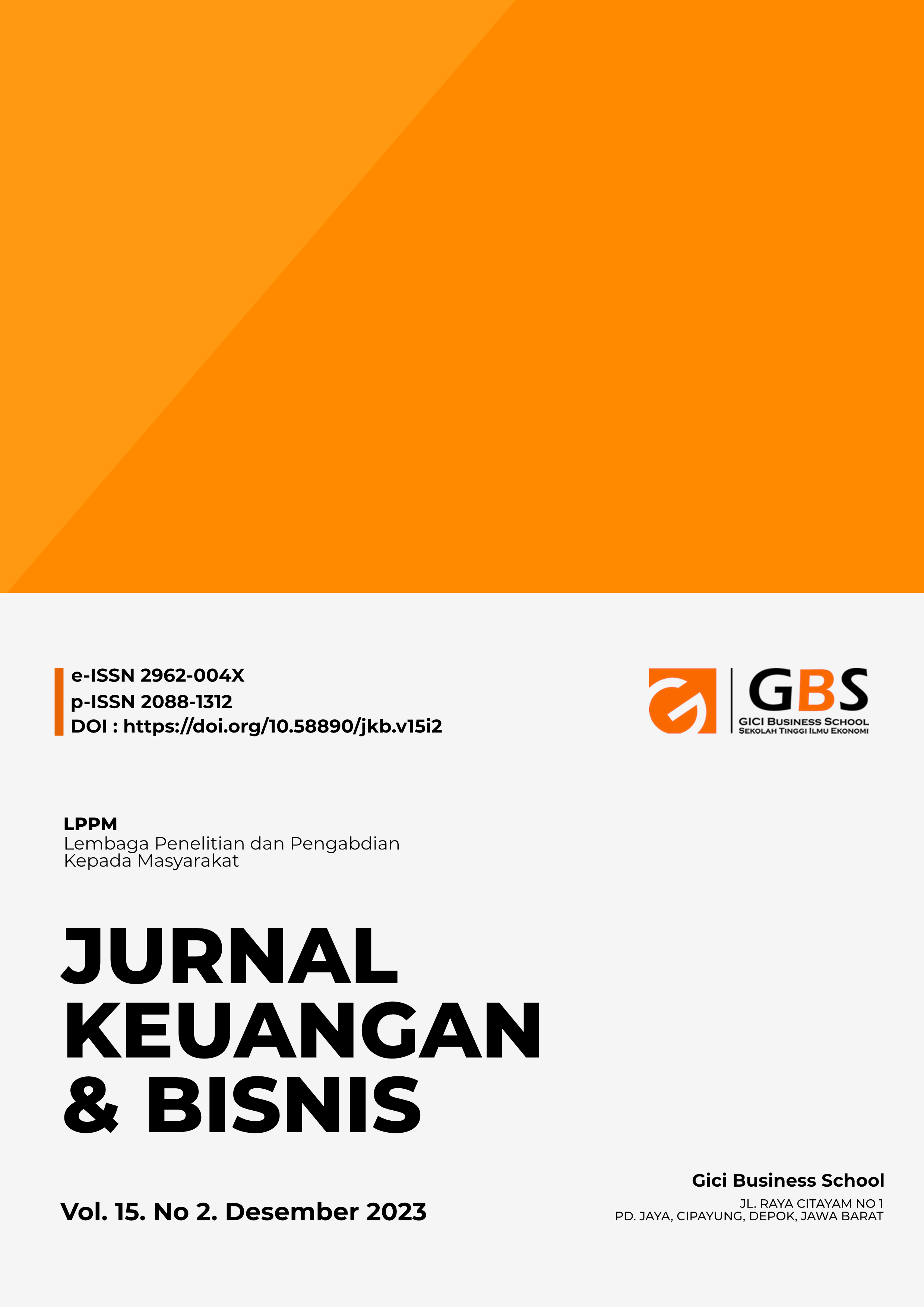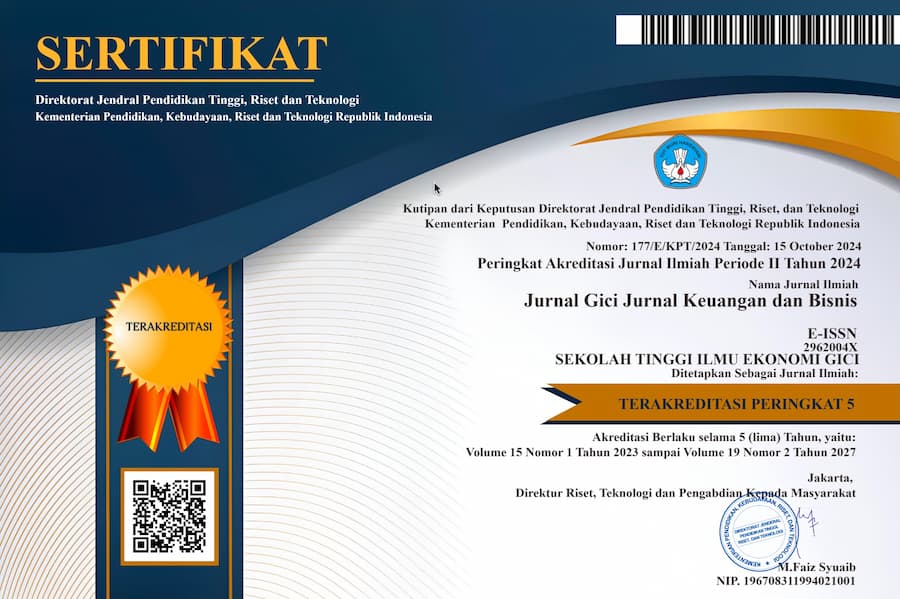PENGARUH PERSEPSI DUKUNGAN PERUSAHAAN, SUPERVISOR, KELUARGA DAN TEMAN TERHADAP SELF ESTEEM DAN SELF EFFICACY PARA TENAGA PEMASAR DI PERUSAHAAN PEMBIAYAAN
DOI:
https://doi.org/10.58890/jkb.v15i2.191Keywords:
Tenaga Pemasar, Persepsi Dukungan, Self Esteem, Self Efficacy.Abstract
The aim of this research is to determine the strength of several perceived support variables that influence the self-esteem and self-efficacy of marketers. This research is important, because marketers are the backbone of finance companies. As a marketer, you must have high self-confidence. With the job characteristics of having to deal directly with consumers through the process of persuading, influencing and convincing consumers amidst intense competition from competing companies, a marketer must be able to convince himself before convincing others. Referring to the breathe-edu.co.uk page, self-confidence is formed by self-efficacy and self-esteem. Using a quantitative approach with a survey method of 168 marketers from 42 finance companies in East Jakarta and Bekasi, which were then analyzed using a Structural Equation Model (SEM) approach based on Partial Least Square (PLS). After carrying out a measurement model test (outer model analysis) and a structural model test (inner model analysis), the conclusion is that perception of friends and family support has a significant effect on the self-esteem and self-efficacy of marketers. Perception of supervisor support has a less significant effect on the self-esteem and self-efficacy of marketers. Perception of company support has a significant effect on the self-esteem of marketers but has a less significant effect on the self-efficacy of marketers.
Downloads
References
Bhardwaj, P. (2019). Types of sampling in research. Journal of the Practice of Cardiovascular Sciences, 5(3), 157. https://doi.org/10.4103/jpcs.jpcs_62_19
Bonney, L., Plouffe, C. R., & Wolter, J. (2014). “I think I can...I think I can”: The impact of perceived selling efficacy and deal disclosure on salesperson escalation of commitment. Industrial Marketing Management, 43(5), 826–839. https://doi.org/10.1016/j.indmarman.2014.04.010
Fatimah, S. E., & Setiawan, A. (2019). Family Background Factors and Entrepreneurship Education Toward Entrepreneurial Intent Through Self Efficacy. International Journal of Business and Technology Management, 1(4), 19–25.
Foehrkolb, C. (2016). Quality of Family Life as a Factor or Self-Esteem [McKendree University]. https://www.mckendree.edu/academics/scholars/issue6/foehrkolb.htm
Gencer, E., & Ilham, E. L. (2012). Examining badminton athletes’ self-esteem. Journal of Physical Education And Sport Sciences, 6(1), 94–101.
Ibrahim, A. S., & Ertina, S. (2019). The Influence of Peer Support and Self-Efficacy Against Academic Procrastination on Teenagers’ Online Game Addiction. Advances in Social Science, Education and Humanities Research (ASSEHR), 304(Acpch 2018), 35–38. https://doi.org/10.2991/acpch-18.2019.8
Ibrahim, H. I., Jaafar, A. H., Kassim, M. A. M., & Isa, A. (2016). Motivational Climate, Self-Confidence and Perceived Success among Student Athletes. Procedia Economics and Finance, 35(October 2015), 503–508. https://doi.org/10.1016/s2212-5671(16)00062-9
Indrawati, N. K., Salim, U., Djumahir, & Djawahir, A. H. (2015). Moderation Effects of Entrepreneurial Self-efficacy in Relation between Environmental Dimensions and Entrepreneurial Alertness and the Effect on Entrepreneurial Commitment. Procedia - Social and Behavioral Sciences, 169(August 2014), 13–22. https://doi.org/10.1016/j.sbspro.2015.01.281
Irawan, G. A., Darmawati, D., & Anggraeni, A. I. (2019). The Role of Perceived Supervisor Support for enhancing Self Efficacy in The Disruption Era ( Industry 4 . 0 ): Research on Rural Bank BKK Mandiraja Banjarnegara. International Conference on Rural Development and Enterpreneurship, 5(1), 213–219.
Jeong, M., Zhang, D., Morgan, J. C., Ross, J. C., Osman, A., Boynton, M. H., Mendel, J. R., & Brewer, N. T. (2019). Similarities and Differences in Tobacco Control Research Findings from Convenience and Probability Samples. Annals of Behavioral Medicine, 53(5), 476–485. https://doi.org/10.1093/abm/kay059
Liu, J. Y., Yang, J. P., Yang, Y., & Liu, Y. H. (2015). The relationships among perceived organizational support, intention to remain, career success and self-esteem in Chinese male nurses. International Journal of Nursing Sciences, 2(4), 389–393. https://doi.org/10.1016/j.ijnss.2015.01.004
Orth, U. (2018). The family environment in early childhood has a long-term effect on self-esteem: A longitudinal study from birth to age 27 years. Journal of Personality and Social Psychology, 114(4), 637–655. https://doi.org/10.1037/pspp0000143
Ozkoc, A. G., & Bektas, T. (2016). Organizational Support and Self-Efficacy as the Predictors of Dissenter Behavior among Hotel Employees. International Journal of Academic Research in Business and Social Sciences, 6(5), 285–305. https://doi.org/10.6007/ijarbss/v6-i5/2143
Pollard, K. (2018). An Examination of the Relationships among Organizational Support , Self-Efficacy Beliefs , and Engagement in Data-Driven Decision Making [The University of Southern Mississippi The]. https://aquila.usm.edu/dissertations/1563
Rama, L., & Sarada, S. (2017). Role of self-esteem and self-efficacy on competence - A conceptual framework. IOSR Journal of Humanities and Social Science, 22(2), 33–39. https://doi.org/10.9790/0837-2202053339
Reynolds, A. D., & Crea, T. M. (2018). Peer influence processes for youth delinquency and depression. Journal of Adolescence, 43(2015), 83–95. https://doi.org/10.1016/j.adolescence.2015.05.013
Sedgwick, P. (2013). Convenience sampling. Bmj, 347(oct25 2), f6304–f6304. https://doi.org/10.1136/bmj.f6304
Sexton, M. (2022). Convenience sampling and student workers: Ethical and methodological considerations for academic libraries. The Journal of Academic Librarianship, 48(4), 102539. https://doi.org/10.1016/J.ACALIB.2022.102539
Shi, J., Wang, L., Yao, Y., Su, N., Zhao, X., & Chen, F. (2017). Family impacts on self-esteem in Chinese college freshmen. Frontiers in Psychiatry, 8(DEC). https://doi.org/10.3389/fpsyt.2017.00279
Sitepu, D., & Sahri, Z. (2017). Self-Confidence in Henry’s Fielding. Language Literacy: Journal of Linguistics, Literature and Language Teaching, 1(1), 141–162.
Supriyanto, A., & Hendiani, N. (2018). Aspect , Validity , And Reliability Family Support Perception Scale for Substance Abuse Disorders. E-Journal.Unipma.Ac.Id, 8(1), 7–18. https://doi.org/10.25273/counsellia.v8i1.2268
Whitener, S. (2017). forbes How Self-Efficacy Changes Your Self-Confidence. Https://Www.Forbes.Com. https://www.forbes.com/sites/forbescoachescouncil/2017/12/06/how-self-efficacy-changes-your-self-confidence/#529f8ecb5ff7.














